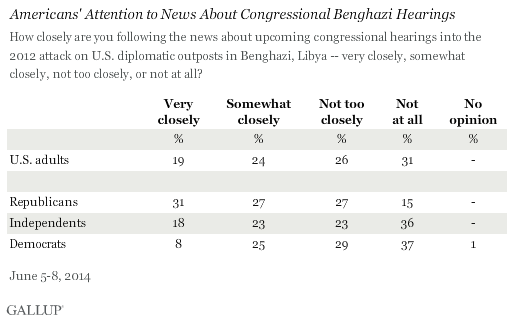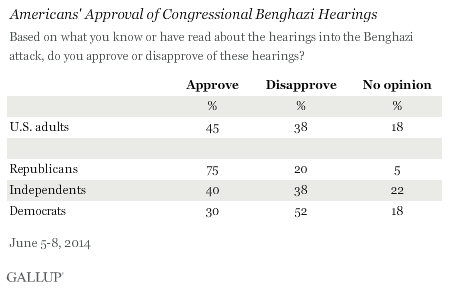PRINCETON, NJ -- As the Republican-led House of Representatives launches the eighth congressional investigation into the 2012 terrorist attack against American diplomats in Benghazi, Libya, fewer than one in five Americans say they are following the story "very closely." Another 24% say they are following it "somewhat closely," while the slight majority, 57%, are paying little or no attention.

The combined 43% of Americans who report paying very or somewhat close attention to news about the upcoming Benghazi hearings in Gallup's June 5-8 poll falls well short of the average 60% attention-to-news rating in Gallup's data bank of major news stories measured since 1991. In fact, it ranks 189th out of the 224 news events Gallup has measured.
And although attention may rise once the hearings get under way, it is not much lower than in May 2013 during a previous set of Benghazi hearings. At that time, barely half of Americans (53%) were following the ongoing congressional hearings very or somewhat closely.
Currently, Republicans are significantly more likely than Democrats and independents to say they are following this news story very closely. However, even Republicans' combined "close attention" score of 58% falls short of Gallup's historical average for all major news stories.
Party-Based Support Ranges From Broad, to Mixed, to Tepid
The upcoming hearings are part of a Republican-led U.S. House Select Committee investigation that was launched last month to further review the terror incident at the Benghazi consulate. Though the Democratic-led Senate has also held hearings on the matter, many Democrats see the newest House investigations as an attempt to weaken either Democratic President Barack Obama or Hillary Clinton, the possible future Democratic presidential nominee and the secretary of state at the time of the attack.
Given the relatively light attention that Americans say they are paying to the Benghazi investigations, it is understandable that they issue no decisive judgment about the hearings themselves. Slightly more Americans say they approve than disapprove of the hearings -- 45% vs. 38%, respectively -- but neither position garners majority support, in part because 18% have no opinion on the matter.

Independents' views are especially ambiguous, with about four in 10 approving as well as disapproving. Democrats are also fairly mixed: Just over half, 52%, say they disapprove of the hearings, while 30% approve and 18% have no opinion. Republicans are the most opinionated on the matter, and the most supportive of the hearings, with three-quarters approving.
Bottom Line
Despite much partisan debate in May about whether a new round of congressional investigations into the deadly 2012 terrorist attack against American diplomats in Benghazi should proceed, relatively few Americans say they are paying very close attention to the matter. As the hearings get under way, that could change, but the initial results suggest these hearings have a long way to go to reach the level of attention paid to a different investigation 16 years ago -- congressional impeachment hearings against then-President Bill Clinton. In December 1998, Gallup found 77% of Americans following those hearings very or somewhat closely.
The comparison is important because Republicans' decision to impeach Clinton is often credited -- or blamed, depending on the political vantage point -- for temporarily harming the Republican Party's image, and in the process boosting Clinton's standing with the American people. Many observers now wonder whether Republicans risk making the same mistake with Benghazi, by looking like they are engaged in a partisan-based effort to discredit former Secretary of State Hillary Clinton.
For now, given Americans' relatively low attention to and moderate public approval of the hearings, the risk-to-reward ratio may be favorable for the GOP. Should the hearings produce no new findings, they may be quickly forgotten, whereas if Republicans uncover new evidence that supports their claims of incompetence or cover-up by the administration, the public seems open to learning about it. Indeed, in May 2013, Gallup found 69% of Americans agreeing that the issues being raised in the Benghazi hearings at the time were serious matters that needed to be investigated.
Tuesday's news that U.S. special operations forces captured one of the key suspects in the attack could, however, change the dynamic.
Survey Methods
Results for this Gallup poll are based on telephone interviews conducted June 5-8, 2014, on the Gallup Daily tracking survey, with a random sample of 1,027 adults, aged 18 and older, living in all 50 U.S. states and the District of Columbia.
For results based on the total sample of national adults, the margin of sampling error is ±4 percentage points at the 95% confidence level.
Interviews are conducted with respondents on landline telephones and cellular phones, with interviews conducted in Spanish for respondents who are primarily Spanish-speaking. Each sample of national adults includes a minimum quota of 50% cellphone respondents and 50% landline respondents, with additional minimum quotas by time zone within region. Landline and cellular telephone numbers are selected using random-digit-dial methods. Landline respondents are chosen at random within each household on the basis of which member had the most recent birthday.
Samples are weighted to correct for unequal selection probability, nonresponse, and double coverage of landline and cell users in the two sampling frames. They are also weighted to match the national demographics of gender, age, race, Hispanic ethnicity, education, region, population density, and phone status (cellphone only/landline only/both, and cellphone mostly). Demographic weighting targets are based on the most recent Current Population Survey figures for the aged 18 and older U.S. population. Phone status targets are based on the most recent National Health Interview Survey. Population density targets are based on the most recent U.S. census. All reported margins of sampling error include the computed design effects for weighting.
In addition to sampling error, question wording and practical difficulties in conducting surveys can introduce error or bias into the findings of public opinion polls.
View survey methodology, complete question responses, and trends.
For more details on Gallup's polling methodology, visit www.gallup.com.
